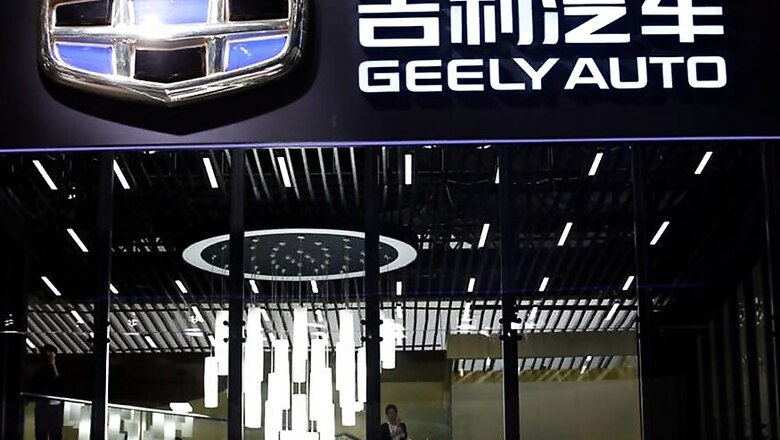
views
Automaker Geely's purchase of a $9 billion stake in Mercedes maker Daimler rekindled fears in Germany of its highly-prized expertise falling into Chinese hands.
Economy minister Brigitte Zypries stuck to Berlin's position that Geely's swoop was a business matter, but said Germany's openness must not be exploited by other countries.
Geely, which owns rival Swedish carmaker Volvo, is pushing Daimler for access to know-how in electric and autonomous cars.
A German parliamentary committee will question government officials on whether Geely has violated disclosure rules and whether loopholes in securities trading law need to be closed, the Stuttgarter Zeitung and Stuttgarter Nachrichten newspaper reported.
Germany tightened its rules on foreign takeovers last year, the first European Union country to do so after a series of deals saw China gain access to high-tech know-how, while attempts by German companies to buy full control of Chinese rivals remains prohibited.
Although under German law, the government can only intervene if a threshold of 25 percent is exceeded, investors must abide by market rules, Zypries said in interviews with Daimler's home-town newspaper Stuttgarter Zeitung and Handelsblatt newspaper.
Geely revealed its 9.7 percent stake in Daimler, surprising the market as it had not disclosed having crossed regulatory thresholds of 3 and 5 percent.
Financial and markets regulator BaFin, which oversees the proper disclosure of stakes said it was investigating whether there had been any breach of disclosure rules, which can result in fines of 10 million euros or more.
The Chinese carmaker first approached Daimler in November and asked it to issue shares so it could buy a stake, as well as for access to battery technology to help set up an electric car joint venture in Wuhan, China.
Daimler, which employs 289,000 people, declined to do a deal as it had reservations about a new industrial alliance for fear of alienating its existing Chinese joint venture partner BAIC, a person familiar with the carmaker's thinking said.
Daimler and BAIC on Sunday said they were planning to co-invest more than 11.9 billion yuan ($1.88 billion) to build a new local production base.
"Daimler has already rejected Geely’s overtures once, and Daimler execs we spoke with argue it’s simply not clear what Geely could offer Mercedes," Bernstein Research analyst Robin Zhu said in a note.
STEALTH RAID
Geely responded to the rejection in November by enlisting Dirk Notheis, the former Chief Executive of Morgan Stanley in Germany and Yi Bao, a former CEO of Morgan Stanley Huaxin Securities, sources familiar with the matter told Reuters.
Notheis, who declined comment, and Yi Bao, who could not be reached, devised a way for Geely to build a significant stake in Daimler using aggressive takeover tactics which German regulators had sought to quash.
Geely worked with Bank of America Merrill Lynch, which declined to comment on Monday, to help secure a 9.69 percent voting stake using derivatives to help skirt disclosure requirements, two people familiar with the deal told Reuters.
Mercedes-Benz executives in Stuttgart were at first caught off guard by the approach, but welcomed Geely in meetings on Monday to see how to "constructively discuss" industry changes.
Zhejian Geely Holding also owns several other carmakers including Sweden's Volvo Cars, London's black-cab maker LEVC and its own Geely Automobile Holdings. It has agreed to buy a $3.3 billion stake in Volvo Trucks.
KNOCK-ON IMPACT
The first sign of wider ramifications from Geely's move on Daimler surfaced on Monday as Volvo Trucks dropped the chief executive of Geely's Volvo Cars from its board, citing competition concerns with rival Daimler.
And EU trade ministers will meet this week to discuss a range of issues including how better to protect strategically important European companies from unwanted investors.
Germany's DIHK chambers of industry and commerce representing 3.6 million companies in Europe's largest economy welcomed Geely's actions.
"In principle, it is an honour that foreign investors take interest in German companies," Volker Treier, the DIHK's head of foreign trade was quoted by Stuttgarter Zeitung and Stuttgarter Nachrichten as saying.
Several major deals during 2017 raised German sensitivities about multi-billion euro foreign takeovers, notably Chinese home appliance maker Midea Group buying German robotics firm Kuka, and Hong Kong bShing'sire Li Ka-shing's buying German metering firm Ista.
"The events of last Friday are the latest demonstrations of China's growing confidence and assertiveness, growing desire to impose its will on global affairs, and growing willingness to exploit the German OEMs' heavy reliance on Chinese profits," Bernstein Research said.
Also Watch
















Comments
0 comment